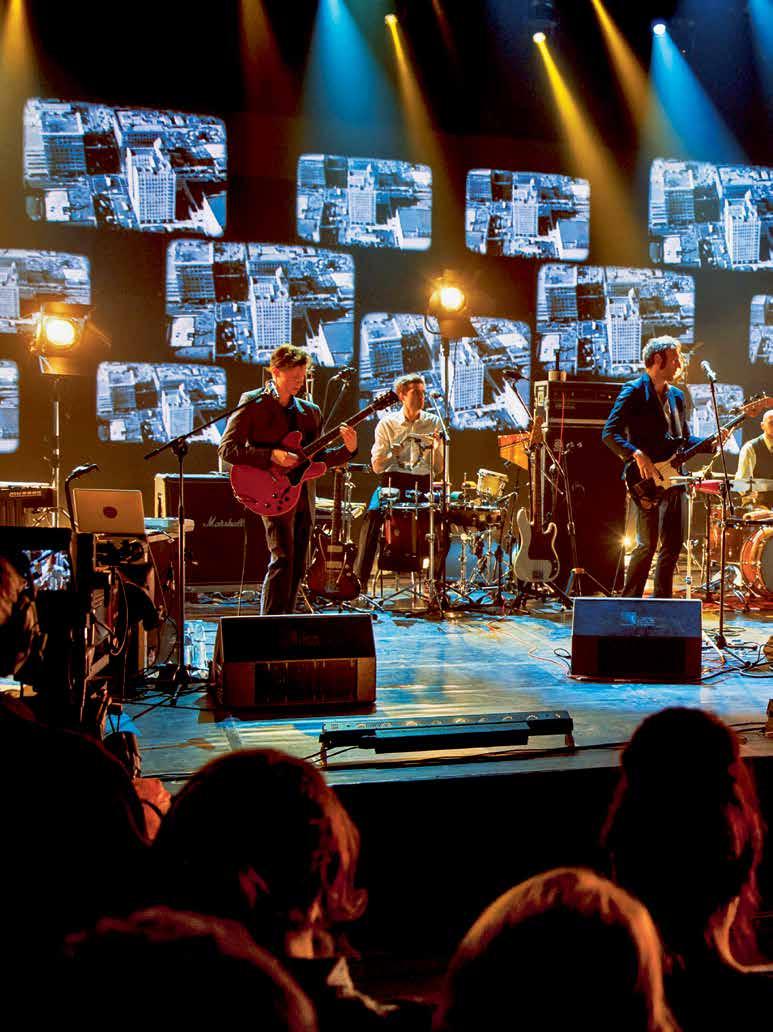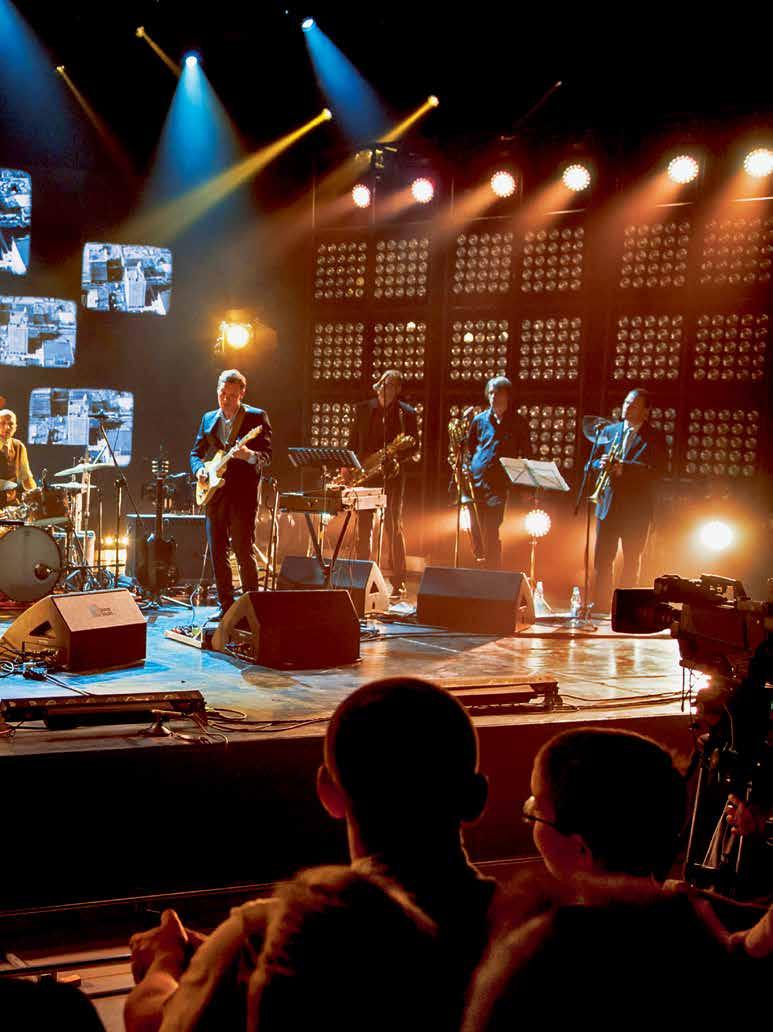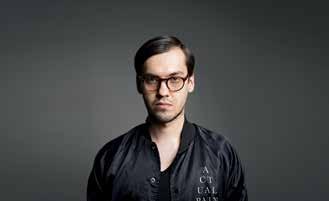
5 minute read
Pop music
Rich and varied
The best time to experience the richness and variety of the Polish pop-music scene is during the summer festivals which are, of course, very popular. This includes the posthippie Woodstock Festival Poland which breaks attendance records each year with its highly original music; the more mainstream Open’er Festival which can compete with Europe’s biggest musical events; Katowice’s alternative off Festival, and the dark electroavant garde Unsound Festival which takes place every autumn in picturesque Cracow. Even fans with more specific musical tastes will find something to suit them. Lovers of techno music should head up to Białystok’s Up to Date festival; electro-dance (broadly defined) to Audiriver in Płock; industrial music lovers down to Wrocław’s Avant Art while reggae fans should head straight to Ostróda. Meanwhile, the roots of modern music can still be heard at Warsaw’s ‘All The World’s Mazurkas’ festival where traditional forms of music are performed by classical and jazz musicians and village music bands. Poland’s traditional music was a particular love of Chopin and has its roots in the three national Polish folk dances: the mazurka, the kujawiak and the oberek. The rich variety
Advertisement
of Polish festivals has even caught the eye of online pop-culture benchmarks such as ‘Pitchfork and ‘Wire’ which often run media coverage on events.
The power of independence Independent record labels are also something of a phenomenon – from hiphop labels with their own loyal followers, to Poland’s ever-strong metal scene, as well as the electronic Lado abC with its flagship band Mitch and Mitch (aboVe), indie-rock Thin Man Records and urban-folk record label Karrot Kommando. There are also record labels which delve into various underground micro-styles, producing music on cassette tapes and vinyl records such as Recognition Records, Pets Recordings, mik.musik.!., Instant Classic, Sangoplasmo Records, Requiem Records, bdTa and Transatlantyk. The sheer number of music producers ensure that Poland stays ahead of the game on the world music scene. We are also a force to be reckoned with when it comes to our various genres of metal: bands such as Behemoth, Decapitated and Vader are world leaders on the metal scene •

Known across the atlantic
Pawęł Sęk has found success across the Atlantic having been nominated for a Grammy Award three times. As a music producer, he has already worked with names such as Taylor Swift, FUN., Jay-Z and Kanye West, as well as winning a contest for his remix of one of Beyonce’s song in collaboration with fellow music producer JIMEK. Another Polish artist, the Łódź-born vocalist, Iza Lach (RIGhT), has also worked with rap legend Snoop Dogg for many years •

Not just jazz
Early in 2014 Włodek Pawlik became the first Polish jazz pianist to win a Grammy Award, capturing the award for the ‘Best Large Jazz Ensemble Album’ category for his ‘Night In Calisia’. The album was recorded with Randy Brecker in Kalisz with the Kalisz Philharmonic Orchestra. It didn’t really come as a surprise – rather it just confirmed the high reputation Polish jazz enjoys across the world: jazz players and fans worldwide can reel off the names of icons such as Zbigniew Namysłowski, Tomasz Stańko (RIGhT), Michał Urbaniak and Krzysztof Komeda even in their sleep. Yet Polish jazz is continually evolving, particularly on the Warsaw scene which is centered around the record labels For Tune and Lado AbC as well as the Pardon To Tu club. Musicians such as Marcin Masecki, Wojciech Mazolewski, Mikołaj Trzaska, Jerzy Rogiewicz, Wacław Zimpel, Ksawery Wójciński and Hubert Zemler are all introducing new elements such as ethnic, classical and minimalist music, as well as free improvasation, rock and techno. Trying to stay ahead of the game, Polish jazz is doing everything in its power to make sure it’s not only jazz •
Add to your favourites
The Dumplings
In only six months this musical duo (TOP RIGhT) has transformed itself from a pair of shy high-school students into one of the most sought-after performers in Poland.
‘We started when we were fifteen. Our first concerts were at school, at Christmas or at the end of the school year events, and we had to get permission from our parents for our first concert tour. We’re both a bit weird really and this comes across in our music and in the lyrics. At first glance none of it seems to make sense, but there are loads of references to everyday life and literary illusions. For example, our song Słodko-słony cios is about the combination of rice cakes and Nutella’ •
Dawid Podsiadło
22 year old Dawid Podsiadło is the wunderkind of Polish pop, having won the first edition of the ‘X-Factor’ programme. He now performs solo, under his own name, and as a member of the garage-rock band Curly Heads. His first album became a diamond disc best-seller. ‘I’m an incurable anglophile. I’m also a bit of a computer game geek – the titles of both my albums are closely related to the Final Fantasy games’.
The Phantom
Hiding behind this pseudonym is Bartosz Kruczyński (bELOW), one of Poland’s most interesting electronic music producers.
‘I love spending time in city parks and walking along the Vistula in Warsaw, and I love Polish music from the 60s, 70s and 80s. My project Ptaki (Birds) only contains compositions put together from samples of Polish music – original music making I leave for The Phantom. If I had to hashtag the work that I do, I think they’d be #Romanticism and #Orientalism. My last album was inspired by extreme natural phenomena like the huge hail-stones of the meteorite showers over Russia’ •
Król
Each year, early in the spring, Błażej Król releases a new album, recording dark electronic music under the names of KRÓL (previously a member of the duet UL/KR). Swiss punctuality meets Polish melancholy?
‘My music is trance-like and unpredictable. It has to sting the listener where they want to be tickled, and tickle them where they want to be hurt. To be honest, I record these albums for my wife so she can keep herself amused in the car’ •
Raphael Rogiński
One of Poland’s most original guitarists, Rogiński (AbOVE) feels at home performing avant garde, jazz, folk music or plain old rock’n’roll. Yet it was Jewish klezmer music that initially sparked his interest:
‘I used to listen to Hasidic music so much I’d even hear it in my sleep. I eventually set up the group ‘Shofar’ with the distinguished Polish musicians Mikołaj Trzaska and Macio Moretti and we tried to recreate what I’d seen in my dreams. But not everyone liked our contemporary approach to traditional music. At Jewish music festivals people were expecting time-honoured, unaltered performances and many creative people are afraid to do anything new with Jewish culture. There’re afraid of breaking some sort of a taboo’ •











